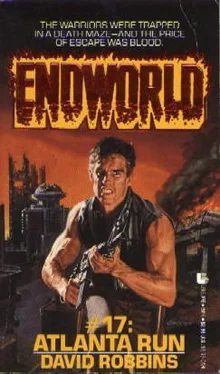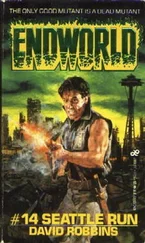David Robbins - Atlanta Run
Здесь есть возможность читать онлайн «David Robbins - Atlanta Run» весь текст электронной книги совершенно бесплатно (целиком полную версию без сокращений). В некоторых случаях можно слушать аудио, скачать через торрент в формате fb2 и присутствует краткое содержание. Город: New York, Год выпуска: 1989, ISBN: 1989, Издательство: Leisure Books, Жанр: sf_postapocalyptic, Боевая фантастика, на английском языке. Описание произведения, (предисловие) а так же отзывы посетителей доступны на портале библиотеки ЛибКат.
- Название:Atlanta Run
- Автор:
- Издательство:Leisure Books
- Жанр:
- Год:1989
- Город:New York
- ISBN:978-0843928167
- Рейтинг книги:5 / 5. Голосов: 1
-
Избранное:Добавить в избранное
- Отзывы:
-
Ваша оценка:
- 100
- 1
- 2
- 3
- 4
- 5
Atlanta Run: краткое содержание, описание и аннотация
Предлагаем к чтению аннотацию, описание, краткое содержание или предисловие (зависит от того, что написал сам автор книги «Atlanta Run»). Если вы не нашли необходимую информацию о книге — напишите в комментариях, мы постараемся отыскать её.
Atlanta Run — читать онлайн бесплатно полную книгу (весь текст) целиком
Ниже представлен текст книги, разбитый по страницам. Система сохранения места последней прочитанной страницы, позволяет с удобством читать онлайн бесплатно книгу «Atlanta Run», без необходимости каждый раз заново искать на чём Вы остановились. Поставьте закладку, и сможете в любой момент перейти на страницу, на которой закончили чтение.
Интервал:
Закладка:
“Is that the only reason you want him?”
“What’s that supposed to mean, Clinton?”
“You don’t fool us. We all know about your amorous predilection for his type.”
“So? You have the same predilection.”
“That’s enough. Stick to the issue at hand.”
“Sorry, Sol.”
Blade’s intellectual clarity returned in a rush. He perceived he was flat on his back, his arms and legs outstretched, his ankles and wrists secured firmly to—what?
He opened his eyes and squinted in the bright glare of brilliant overhead lights.
“Our Adonis has awakened,” someone announced.
“Greetings, outsider.”
Blade took his bearings as his vision adjusted. He was lying on a smooth, brown-tiled floor in the center of a circular amphitheater. A green wall eight feet in height encompassed him, and rising above the wall were twelve rows of wooden seats, each tier successively elevated. Seated on the lowest level, their heads and shoulders visible over the wall, were seven people, four men and three women, each one attired in a shimmering golden gown.
“Greetings,” repeated the tallest man, a leonine figure with a mane of white hair. “I am Sol Diekrick.”
Blade surveyed the seven. “You must be the Peers,” he deduced.
“We are,” Sol confirmed imperiously.
“He has an intellect to complement his physique,” commented a woman with tresses of a sepia hue.
“Behave yourself, Lilith,” remarked a portly man to her left.
“Up yours, Clinton,” Lilith responded sweetly.
Sol Diekrick raised his right hand and commanded instant silence. He smiled at the giant. “My apology for the conduct of my associates. They sometimes forget themselves.”
A bespectacled, gaunt man seated between Diekrick and Lilith leaned forward and glared at the prisoner. “What is your name? Where are you from?”
“My name is Jack Snow,” Blade said.
“You lie!” snapped the man with the glasses. “We know you gave that fabrication to the Storm Police, but our files indicate there never was a cousin of Llewellyn Snow by the name of Jack.”
“Your computer is incorrect.”
“Our computer system is virtually infallible, you primitive!”
“Eldred, please control yourself,” Sol interjected in a paternal tone. He smiled down at the Warrior. “You must forgive our lack of manners.”
Blade glanced at his wrists and found wide strips of an orange material binding him to the floor.
Sol noticed. “Simply a security precaution, I assure you, necessitated by your disinclination to cooperate with duly constituted authorities.”
“In other words,” Lilith said with a smirk, “we had to tie you up because the Storm Police were afraid you’d strangle us to death.”
Blade thought of the tramp. “Where’s Glisson?”
“Who?” Sol replied. “Oh. You mean the filthy degenerate taken into custody with you? He’s being held in a cell until we have rendered a final disposition of your case.”
“Where am I?” Blade asked.
“You are in the Civil Directorate,” Sol Diekrick answered. “My Directorate. You’re on the ninth floor in a room we reserve for special interrogations.”
“How long was I out?”
“A few hours,” Sol divulged. “Your recuperative powers are amazing.
You must have exceptional stamina.”
“I’ll bet that’s not all he has,” Lilith said.
Sol sighed and leaned back. “Allow me to introduce my associates.
Lilith Frickan here, the one with the raging hormones, heads the Orientation Directorate.”
Lilith grinned and winked.
“Eldred Morley is in charge of the Euthanasia Directorate,” Sol revealed.
The man with the glasses scowled at the Warrior.
Dietrich nodded at the portly Peer. “Clinton Brigg handles Ethics.”
“Hi, handsome,” Brigg remarked.
“As for the rest,” Sol said, and indicated a brunette, “Rebecca Sanger heads the Life Directorate.” He pointed at a man with black hair and a cleft chin. “Alec Toine has Progress.”
Toine nodded.
“And last, but definitely not least,” Sol said, gazing at an elderly woman with aquiline features, “Dorothy Coinnak is responsible for the Community Directorate.”
Blade studied each of them critically, then shook his head.
“What is it?” Sol inquired.
The Warrior stared at Diekrick. “Appearances can be deceiving. All of you appear to be sane.”
“Implying we are not,” Sol said.
“You’re warped.”
Sol chuckled and rested his chin in his right hand on the wall. “By whose standards? Yours?”
“By anyone’s standards,” Blade replied. “I’ve seen and heard enough to convince me that you’re either off the deep end, or all of you are power-hungry, petty dictators.”
“We are neither,” Sol stated.
“Says you.”
Eldred Morley stood. “Let’s dispose of this cretin now, Sol. Why should we sit here and allow him to insult us?”
“Sit down, Eldred,” Sol Diekrick ordered.
Morley reluctantly complied.
“That’s better,” Sol said. “Your immaturity is appalling. If you can’t rebut the arguments of a musclebound oaf, perhaps you don’t deserve to hold the exalted post of Peer.”
Morley blanched. “I didn’t mean—”
“I know what you meant,” Sol said, cutting him short. “And don’t insult my intelligence ever again.”
“I won’t,” Morley said hastily.
Sol looked at the giant. “Now where were we? Ahhh, yes. You claim that we’re warped, as you so quaintly phrased it.”
“Convince me otherwise,” Blade stated.
Diekrick folded his arms across his chest. “You erred when you accused us of being petty dictators. We actually view the welfare of our people as our paramount concern.”
Blade laughed.
“You don’t believe me?”
“You have the people of Atlanta right where you want them,” Blade mentioned. “Under your thumb. This Civil Council has stripped the citizens of their freedom. You control every aspect of their lives. You decide what is best for them, and you’ve even gone so far as to regulate the clothes they wear.” He paused. “You’re disgusting.”
“My dear fellow, you misconstrue our intent,” Sol said with an air of condescension. “And your knowledge of America is deficient.”
“America?”
“Yes. Specifically the history of America in the decades preceding World War Three. We have merely continued and improved upon the reforms instituted by our ancestors, and we have succeeded in achieving the goal they dreamed of.”
“What goal?” Blade queried.
“The creation of the world’s first fully humanistic society,” Sol said loftily. “America was becoming increasingly humanistic with each generation. The humanists were effectively organized, and the rank and file, the masses on the street, had no idea what was happening to them.
The average American didn’t know that most of their leaders, their politicians and educators, were humanists. They were unaware that humanism was the prevalent doctrine at a majority of the universities and colleges. Had they known, they would have rebelled because they were strongly opposed to everything humanism stands for.”
“And what does humanism stand for?” Blade questioned.
“Read the humanist manifestos,” Sol replied. “The humanists made no secret of their beliefs, only of the means they employed to restructure society. Humanism has certain basic tenets. There is no God, no spirit reality of any kind. Prayer and worship are meaningless practices, and consequently we have outlawed them. Humanism asserts religion is an obstacle to human progress, not an aid.” He paused and gazed thoughtfully at the Warrior. “The early humanists clearly outlined the design for a secular society, and we’ve implemented their design. Religion has been eliminated. Science is our guidepost and experience our teacher.
Читать дальшеИнтервал:
Закладка:
Похожие книги на «Atlanta Run»
Представляем Вашему вниманию похожие книги на «Atlanta Run» списком для выбора. Мы отобрали схожую по названию и смыслу литературу в надежде предоставить читателям больше вариантов отыскать новые, интересные, ещё непрочитанные произведения.
Обсуждение, отзывы о книге «Atlanta Run» и просто собственные мнения читателей. Оставьте ваши комментарии, напишите, что Вы думаете о произведении, его смысле или главных героях. Укажите что конкретно понравилось, а что нет, и почему Вы так считаете.












